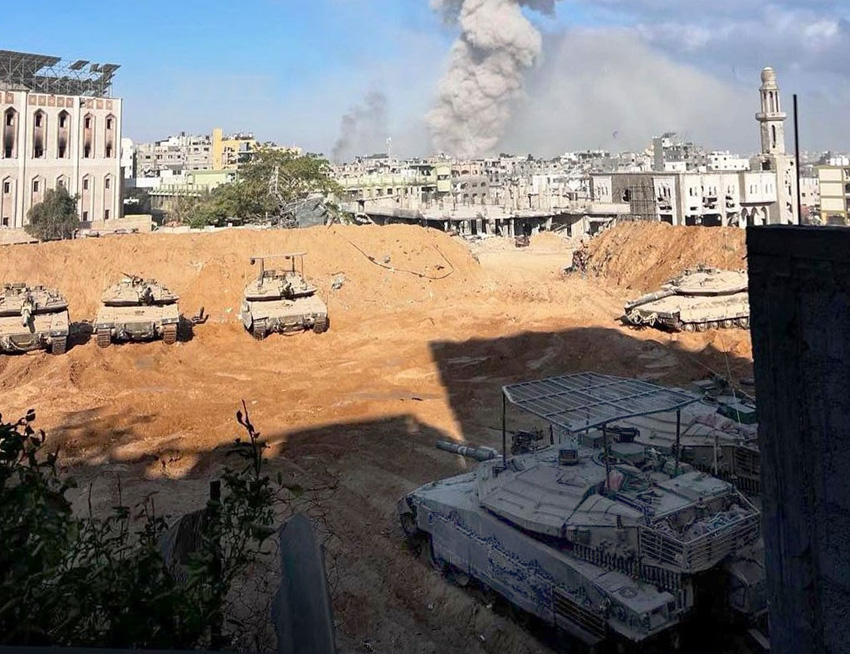
A SENIOR Hezbollah official says that the Lebanese resistance movement is impervious to Israeli threats and remains determined in its fight in support of the Palestinians in the besieged Gaza Strip until they achieve their goals.
Vice President of the Executive Council of Hezbollah, Sheikh Ali Damoush, made the remarks on Sunday, stressing once again that Hezbollah’s decision to continue on the battle front in support of the blockaded Palestinian territory will remain unchanged until the goals are met.
‘The resistance will never accept any change to the rules of engagement or the breaking of existing equations.
‘The more the enemy persists in its aggression and expands its attacks, the more the resistance will increase its response and broaden its operations.
‘The recent Israeli escalation and the threat of new offensive moves within Lebanon will not alter our stance, change our equations, or divert us from the field,’ he said.
‘Escalation will only be met with escalation.
‘We are a people who do not fear threats or intimidation, as we are people of action, work, struggle, and steadfastness. We have confidence in God’s promise of victory and are certain that victory will come with His help and guidance,’ Damoush emphasised.
The Israeli regime has repeatedly attacked southern Lebanon since October 7th last year, when it launched a genocidal war on Gaza. In retaliation, Hezbollah has launched near-daily rocket attacks on Israeli positions.
Latest reports have revealed that some 62,000 Israeli settlers have fled the northern sector of the 1948 Israeli-occupied territories out of fear of Hezbollah’s strikes.
The fighting has forced the evacuation of tens of thousands of Israeli settlers from the northern part of the occupied territories, amid rocket fire and shelling carried out by Hezbollah and allied Palestinian groups.
Damoush further stressed that the occupying entity would not be able to return the settlers to their homes, ‘no matter how loud the cries are, except in one way, and that is: Stop the aggression against Gaza.’
Back in April, Israeli media outlets reported that the number of settlers that had evacuated the area as a result of Hezbollah’s operations stood at a staggering 62,000, with 40 per cent of them considering never returning to the region.
Israeli prime minister Benjamin ‘Netanyahu is caught between the blows of resistance in Gaza and Lebanon, and the internal pressures and divisions, as well as the cries of settlers in the north.’ Damoush said.
‘He doesn’t know how to extricate himself from the predicament he’s entangled in and is unable to achieve the victory he desires due to the steadfastness and tactics of the resistance, which have placed his army in a real war of attrition,’ he added.
‘Whenever the army withdraws from a location in Gaza, the resistance returns to it with even greater strength.
‘The latest innovations and decisions of this beleaguered and defeated (Israeli) army include not entering the tunnels for fear of killing the captives.’
The high-ranking Hezbollah official also stressed that ‘the incapable and failed Israeli army, which has not been able to recover its captives by force over the course of eleven months, will not be able to retrieve them no matter how long the war lasts, except through an agreement that respects the conditions of the resistance.’
Earlier, Sheikh Nabil Qaouk, deputy head of the executive council of Hezbollah, said the resistance is capable of devising new equations in the region, and the Tel Aviv regime has no other choice but to stop its aggression against Gaza.
‘The Zionist regime is weakening day by day, while the power of the resistance is expanding in terms of defensive and combat capabilities, as well as at the military and political levels,’ he said.
Hezbollah has already fought off two Israeli wars against Lebanon, in 2000 and 2006. The resistance forced the regime to retreat in both conflicts.
The Palestinian Health Ministry says the number of Palestinians killed in the Israeli onslaught on Gaza since early October last year is now close to 41,000, mostly women and children.
- Two hospitals in northern Gaza have warned that they will be out of service due to shortages of fuel and medical supplies caused by Israel’s genocidal war on the besieged Palestinian territory.
The Indonesian and Kamal Adwan hospitals, both situated in Beit Lahia, announced on Monday that they will stop working as the occupying regime keeps up its brutal aggression and blockade on Gaza.
In an interview with Al Jazeera, director of Kamal Adwan Hospital, Hussam Abu Safia, warned that operations could stop within 48 hours because of a lack of fuel and critical medical items.
He also noted that fuel shortages in the intensive care unit could lead to the deaths of dozens of children.
Similarly, director of the Indonesian hospital, Marwan Sultan, said that the intensive care unit there has reached its maximum capacity and is filled with critical cases, in addition to ten patients who depend on ventilators.
‘The operating rooms are running non-stop around the clock… If Israel continues to block fuel deliveries, medical services could come to a complete halt, condemning these patients to death,’ he warned.
Israel unleashed the Gaza onslaught on October 7th, 2023, after the Palestinian Hamas resistance group carried out a historic operation against the usurping entity in retaliation for its intensified atrocities against the Palestinian people.
So far, the Tel Aviv regime has killed at least 40,972 Palestinians, mostly women and children, and injured 94,761.
Israel has deliberately targeted hospitals in its offensive, damaging or destroying Gaza’s most important medical facilities in a war crime and a blatant violation of international law.
The regime’s bombing campaign in Gaza has decimated the territory’s healthcare system, with 31 of 36 hospitals damaged or destroyed, according to the World Health Organisation (WHO).